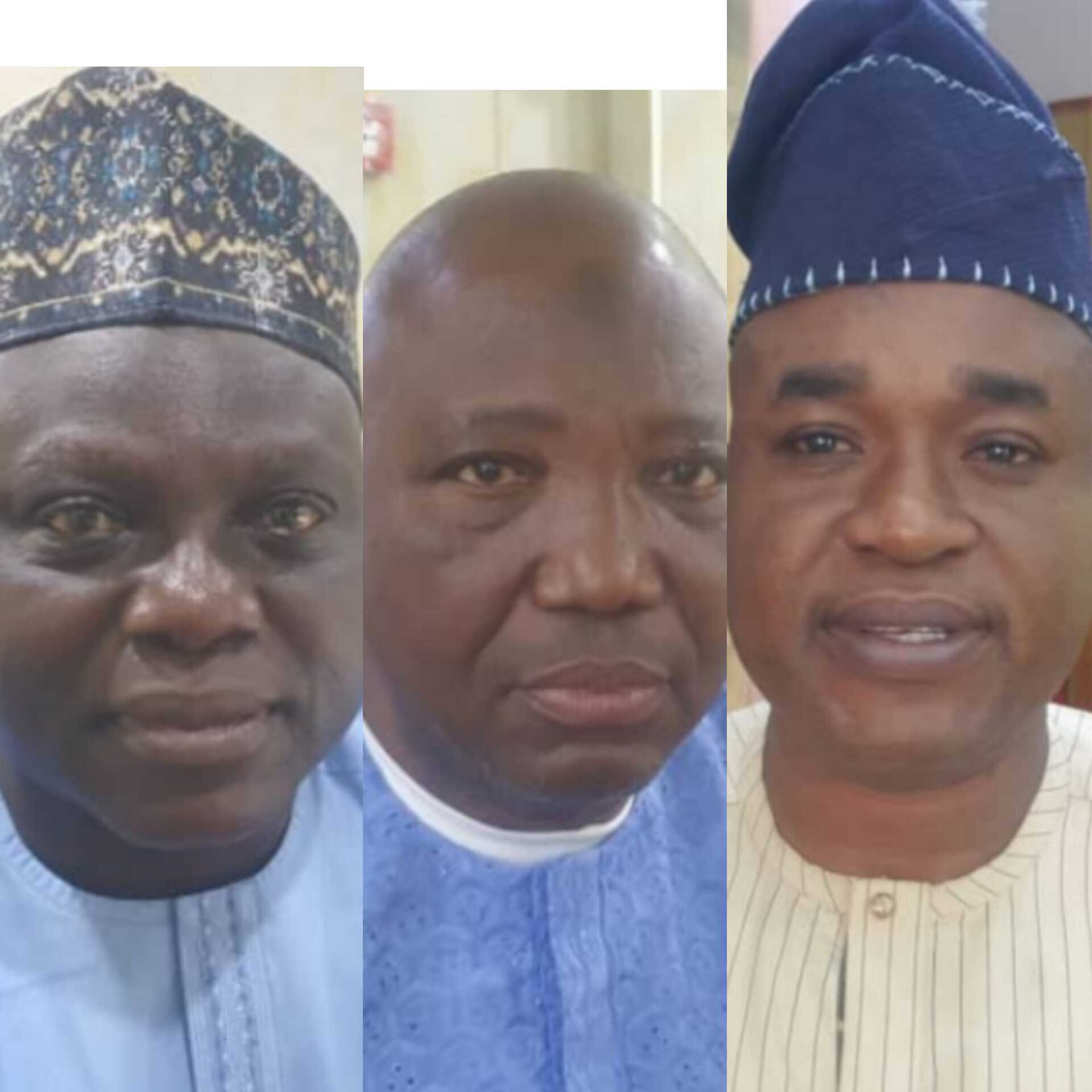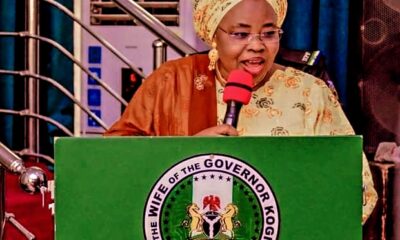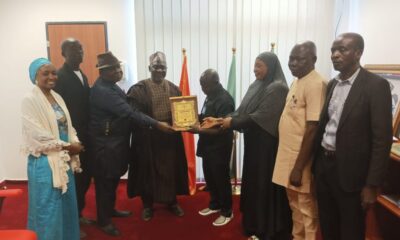Economy
Cardoso’s CBN raises the stakes in interest rate from 24.75% to 26.25%

The Monetary Policy Committee(MPC) of the Central Bank of Nigeria (CBN) has again up the ante in the benchmark interest rate by 150 basis point from 24.75 per cent to 26.25 per cent.
The committee also retained asymmetric corridor at +100 and -300 basis point.
This is just as the MPC also retained the Cash Reserved Ratio at 45 percent and liquidity ratio at 30 percent.
CBN Governor, Olayemi Cardoso, said the focus remains to achieve price stability in a bit to reign in inflation.
This is the third MPC meeting since Cardoso assumed office.

Economy
GICN Rallies for Justice: Exposing GTB’s Alleged Financial Malpractices at NASS Protest

The Global Integrity Crusade Network (GICN) on Tuesday held a significant rally at the National Assembly Complex in Abuja, calling for accountability and transparency in Guaranty Trust Bank Limited (GTB).
This rally followed their earlier revelations on October 3, where they exposed serious allegations of corruption within the bank, often perceived as a pillar of stability by its customers.
During the event, GICN representatives detailed shocking findings from their investigations, which allege that GTB, led by Segun Julius Agbaje, is engaged in a range of illicit activities, including unsolicited account openings, fictitious profit declarations, round-tripping, money laundering, and even financing terrorism.
They spotlighted a troubling case involving Mr. E, a GTB customer who lost funds due to a scam. While GTB recovered part of the lost amount, they failed to reimburse the remaining balance, leading the UK Financial Ombudsman Service to criticize the bank for inadequate response measures.
GICN also pointed to the Central Bank of Nigeria’s Special Investigation Report, which implicated GTB in diverting funds from the Nigerian Electricity Market Stabilization Facility (NEMSF) unlawfully.
Additionally, numerous Nigerians have reported that GTB has been improperly diverting foreign currency remittances from intermediary banks abroad, creating significant obstacles for investors returning to Nigeria.
In a decisive call to action, GICN urged the Economic and Financial Crimes Commission (EFCC), the Central Bank of Nigeria (CBN), and other regulatory agencies to investigate GTB’s practices promptly.
They warned that if these authorities fail to take action, they would seek legal recourse to compel them to fulfill their obligations.
The rally also expressed solidarity with bloggers Precious Eze, Olawale Rotimi, Rowland Olonishu, and Seun Odunlami, who are currently imprisoned on charges many view as an attempt to stifle criticism of GTB’s alleged corruption.
GICN denounced the charges, insisting that the voices of civil society must not be silenced.
Director of Publicity and Mobilization for GICN, Amb. Comr. Adebayo Lion Ogorry, delivered a powerful statement reaffirming their commitment to fighting corruption: “The struggle against corruption is a collective responsibility; for us, there is no retreat, no surrender. Solidarity forever!”
As GICN continues to challenge the status quo, the call for justice and accountability in the banking sector resonates loudly, demanding urgent attention from all corners of the nation.
Economy
Stakeholders urges FG to save Cocoa economy, engage to ensure EUDR compliance

***Put in place Central National Cocoa database for traceability
The Federal Government of Nigeria has been urged to rise up to the occasion to save the cocoa sector from losing out at the European markets by expeditiously engaging for the country to comply with European Union Deforestation Regulation (EUDR) over Cocoa export.
The AUDR regulation is expected to come into force in December this year for which if Nigeria is found not to be compliant, cocoa beans from the country might not be accepted in European markets.
The European market is taking up about 70% of cocoa exports from Nigeria as major buyers but they have set up regulations that they don’t want cocoa harvested from deforested area or those which are the products of child labor.
The European Union Deforestation Regulation (EUDR) aims to curb deforestation and forest degradation driven by EU consumption of certain commodities.
These were contained in a communique on Nigeria’s readiness to comply with the EUDR by the National Cocoa Management Committee(NCMC
The communique which was signed by the acting chairman of the National Cocoa Management Committee(NCMC) Dr. Patrick Adebola and Secretary Ajayi Olutobaba indicated that the urgency of Nigeria’s EUDR Preparedness assessment check is of priority and is highly recommended as soon as possible.
“In this regard, the EU representative gave a commitment to supporting Nigeria for an EUDR Preparedness’ Assessment check as done for Cote D’Ivoire, Ghana and Cameroon if Nigeria lobbies for it. Accordingly, it was roundly endorsed that the Federal Government of Nigeria needs to engage urgently in this regard with the EU.
For the traceability compliance pillar, the communique recommended the urgent need to put in place a Central National Cocoa database that will comprise amongst other indices, the registration of all farms, farmers, processors, exporters, intermediation services providers and buying agents and the relevant MDAs across the 22 cocoa producing States.
“There is no National Database of the current state of play for Traceability/Certification, Forest maps, Legality/Due diligence.
The National Cocoa Management Committee (NCMC) and the International Finance Corporation (IFC) on 19th April, 2024 conducted a hybrid technical roundtable discussion that brought together over 100 cocoa stakeholders and value chain actors drawn from the public, private and the development community, as part of its pioneering efforts to put in place a National framework for EUDR preparedness and compliance.
“The roundtable, which is an integral part of NCMC and IFC partnership to unlocking the potentials in Nigerian Cocoa Ecosystem recommended the following for serious and urgent attention for compliance with the EUDR due diligence pillars on traceability, deforestation free and legality of products.
“The whole essence of the EUDR will be predicated on an updated National Forest Map for the cocoa producing states in particular to indicate deforestation- free cocoa and cocoa products.
“Nigeria needs updated forest map with geo-location of tree crops and other land matters for Traceability. Forestry Research Institute of Nigeria (FRIN) has capabilities for Forests, Tree Cover map, Forest Cover, Forest Loss and Tree Loss for Nigeria.
“The Institute is however hampered by lack of adequate funding even for validating existing Forest data, forest and crop maps.
“Information came out that there is on ground Traceability and Certification to a certain extent but that the data are with the export and processing companies for their own supply chain needs and certification protocols. “Forest Alliance informed the meeting that there is 60% mapping of all Cocoa small scale holders in all Cocoa producing areas outside protected forests.
“Barry Callebaut, claim they map, train and capacitate all their farmers and are thus good on sustainability. It was thus recommended that the Private sector Operators with Traceability/Certification, Deforestation-Free and Legality Compliance records be encouraged to come together to pool such records for Nigeria. NCMC is to facilitate this.
“It was identified that Public Officers need urgent capacity building on a harmonized cocoa-specific protocol particularly for Officers at Forestry Research Institute (FRIN), FMAFS, Cocoa Research Institute of Nigeria (CRIN), the various Produce Inspection Officers at Federal Produce Inspection Service (FPIS), State Produce Inspection Service (SPIS), Standards Organization of Nigeria (SON) and others. “This will be to capacitate them to render support services to the various Stakeholders and reduce bottlenecks that hinder investments. In this regard, it was also recommended that Inter Ministry and Inter Agency cooperation should be improved for information sharing and other matters.
“There is also a need for Regulatory reforms and an improved Legislative framework for Cocoa and Land matters. The need for a new or a review of Legislative framework for land matters was recommended as there were challenges with the current Land use Act that vests all lands in the hands of the State Governments which includes Forests issues.
As a fallout to the roundtable, “The European Union (EU) notified the Federal Ministry of Agriculture and Food security (FMAFS), on the new rules regarding products that are drivers of climate change and biodiversity loss.
“EU being one of Nigeria’s major trading partners also informed Nigeria that non-compliance to EUDR regulation could impact negatively on EU-Nigerian trade.
“The FMAFS responded to the letter from EU by inviting them to conduct EUDR preparedness assessment check like what was done for Ghana, Cote d’Ivoire and Cameroon. Extension for EUDR compliance deadline and also carbon credit consideration was also requested.
“The National Cocoa Management Committee (NCMC) was the outcome of interactive meeting between the Nigerian delegation and Ghana Cocoa Board held in Accra, Ghana on 19th May 2022.
“The Minister of Agriculture approved the establishment of the National Cocoa Management Committee (NCMC), a national coordinating body expected to guarantee quality, traceability, transparency, and sustainability in Cocoa Value Chain on 2nd August 2022 for the purpose of developing a framework for the regulation and monitoring of Cocoa sector’s activities.
“At their inaugural meeting the NCMC came up with draft Bill for the establishment of the National Cocoa Board. The board when fully functional will operate to develop a framework for the regulation and monitoring of the activities of the Cocoa sector to make the industry more transparent; to develop a strategic plan towards the establishment of a Nigerian Cocoa Board.
“The NCMC, as an important regulatory body in the Nigerian Cocoa sector shall upscale their activities to all cocoa producing states.
The NCMC shall organize and conduct a national conference for Commissioners of Agriculture from 36 states and FCT to sensitize them on the importance of cocoa and efforts of the Federal Government towards increased production.
“The NCMC shall develop Local, State and Federal Government strategic implementation plan of the National Cocoa Management Committee; and
“The NCMC shall establish data bank for all Multinational Companies and Exporters of Cocoa Beans from Nigerian Ports.
At the 4th meeting of the NCMC, held on the 6th of June 2024 at Exclusive serene hotel, Abuja, the NCMC resolved to pursue various funding options available to the committee; meeting the EUDR target on deforestation, establishment of a National traceability system in Nigeria it also resolved to strengthen NCMC to metamorphose into National Cocoa Board as obtained in Ghana Cote d’Ivoire and Cameroon and partial regulation of the Cocoa Industry in Nigeria to guarantee quality, transparency, traceability, and sustainability.
At the meeting, the World Cocoa Foundation (WCF) also engaged the NCMC on possible areas of collaboration and the need for partnership options aimed at Sustainable cocoa ecosystems especially through the replication of the Cocoa Forest Initiatives, an initiative of the Foundation currently implemented in, Cameroon, Cote d’ Ivoire and Ghana.
The NCMC also resolved to reach out and bring on-board all relevant government agencies that are already working on EUDR compliance in order to have a unified national response to comply with the regulation.
Economy
Group warns against proposed amendments to CBN Act, says it will weaken its autonomy

**Asks NASS To resist attempt to weaken CBN, Take Away Its Autonomy
The Conference of Civil Societies have warned that many of the proposed amendments to the extant Central Bank of Nigeria (CBN) Act will weaken the bank and its autonomy severely threatened.
Their position aligns with the position of the International Monetary Fund (IMF)
The groups, therefore, urged the National Assembly to resist the attempt to deliberately weaken the CBN, adding that attempting to take away the bank’s autonomy under any guise would be tantamount to throwing spanners into the effective management of the economy.
Addressing newsmen on Monday in Abuja on the economy and monetary policy, the Chairperson of the group Adams Otakwu expressed concern about the Nigerian economy, monetary policy, and its impact on ordinary Nigerians ahead of the forthcoming anniversary of the current administration.
He noted that Nigerians are desirous of having in place a vibrant economy supported by an independent Central Bank.
He urged the government to focus on fixing the economy and not creating confusion by amending sections of the CBN Act that might weaken the institution.
He said: “Nigerians in the past one year have had great expectations concerning a major turn around in the economy. Particularly of interest is the rate of inflation, which has continued to rise. Only last week, the Central Bank of Nigeria increased its Monetary Policy Rate to 26.25% to check inflation, which now stands at 33.69%.
“While we, as civil society groups, continue to engage the CBN and the fiscal authorities to improve the fortunes of the economy, we are of the view that having an independent central bank in place will help to put inflation under check.
“This is why we would like to sound a note of caution ahead of the proposed amendment to the CBN Act by the National Assembly, which we consider ill-timed.
“Without prejudice to the proceedings of the public hearing at the National Assembly, which we shall be part of on Thursday, May 30, 2024, we, in a rare move, align with the position of the International Monetary Fund (IMF) that many of the proposed amendments to the extant CBN Act will weaken the Bank as its autonomy will be severely threatened.
“Studies worldwide show a direct correlation between independent central banks and adequate checks on inflation. We, therefore, urge the NASS to resist the attempt to deliberately weaken the CBN. Attempting to take away the bank’s autonomy under any guise would be tantamount to throwing spanners into the effective management of the economy.
“In a few days, the current administration will be a year in office. We should focus on fixing the economy, not creating confusion by amending sections of the CBN Act that might weaken the institution. Now is not the time to push for an amendment to the CBN Act.
“Our advice is that an amendment to the CBN Act, if any, should wait and be well thought out. The present Act contains enough checks that the National Assembly can trigger, if it so wishes.”
Otakwu appealed to the media “to continue to flag issues around exchange rate pressures, rising input prices and security that still challenge the economy in your reports, thereby putting pressure on the fiscal and monetary authorities to play their constitutional roles in managing the economy.”
-

 Crime8 months ago
Crime8 months agoNemesis catches up with sex-for-grade Lecturer at FUL in Kogi
-

 Newsbite Woman7 months ago
Newsbite Woman7 months agoAt International Day of Families Kogi Governor’s wife harps on sustainable rnvironmental habits
-

 Metro Section7 months ago
Metro Section7 months agoPolice retirees storm N’Assembly, protest over unpaid Pensions
-

 Senate7 months ago
Senate7 months agoSenator Echocho honored by Kogi East NASS workers
-

 Appointment8 months ago
Appointment8 months agoSGF Akume lauds Ododo for superlative performance in 100 days
-

 National8 months ago
National8 months agoActivist teases Timubu for deceiving Nigerians over strengthening of the Naira
-

 Crime8 months ago
Crime8 months agoTragedy as gunmen kill FIRS Staff, Khalid Bichi in Maitama
-

 Metro Section9 months ago
Metro Section9 months agoInsecurity: Ododo Unveils Metropolitan Quick Response Squad